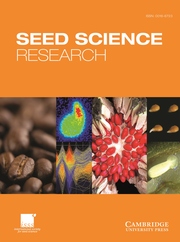Article contents
Remobilization of seed phosphorus reserves and their role in attaining phosphorus autotrophy in maize (Zea mays L.) seedlings
Published online by Cambridge University Press: 30 April 2014
Abstract
Successful remobilization of seed reserves is the driving force behind seedling establishment for maximum final crop outcomes. The remobilization of stored maize seed phosphorus (P), and its allocation towards growing seedlings is critical for P-autotrophy during early ontogeny. We aimed to (1) evaluate the time frame of the origin of P utilized by maize seedlings, including the heterotrophic, transitional and autotrophic phases; and (2) compare P and carbon (C) dynamics in both seed and seedling compartments during the same phases. Using isotopic signatures (32P), we identified different P fluxes (P-heterotrophy, P-transition and P-autotrophy) and determined the proportion of P fluxes from heterotrophic seed P and external P uptake during 23 d of early ontogeny. The P-heterotrophic growth phase lasted from the first to the fourth day after sowing, when seedlings were entirely made up of heterotrophic P originating from remobilized seed P pool. In our experimental conditions, the P-transitional phase, when growing seedlings were supported by both heterotrophic and autotrophic P, lasted from the fifth to the fifteenth day after sowing. Thereafter, seed P reserves were exhausted and seedlings depended entirely on external P uptake, indicating the P-autotrophic stage. Although seed P reserves were remobilized earlier than C reserves, the length of the three growth phases for P and C was similar in the maize seedlings.
- Type
- Research Papers
- Information
- Copyright
- Copyright © Cambridge University Press 2014
References
- 8
- Cited by



